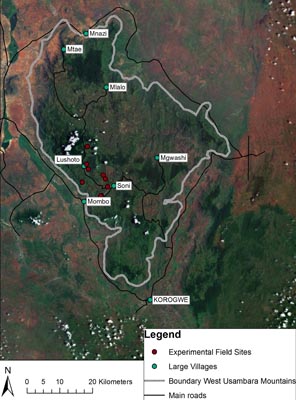Last year we conducted our Masters theses for N2Africa in the Usambara Mountains in Tanzania. You might have seen some of the updates about our research on the N2Africa Facebook page. From October until February we did fieldwork in the Usambaras where we worked toghether with local farmers to study the nutrient deficiencies for the production of common bean. We performed factorial field trials with inoculation and phoshorus and potassium fertilizers as inputs. During the research we collected leaf and soil samples and interviewed farmers. Back in Wageningen all the collected data was statistically analysed and reported. We are happy to share with you that our master theses are completed!
 |
Elise (left) and Jori presenting their research outcomes. Photo credits Rik Schuiling
|
The outcomes pointed at potassium and phosphorus deficiencies as the major soil fertility constraints for the production of common bean in the Lushoto district. The P+K(+Inoculation) treatment gave the best results in terms of grain yield. Farmers in the Usambara mountains are not used to apply (chemical) fertilizers to their bean crops, which highlighted the need to support them with high quality inputs and information on how to manage their (bean) production systems in an adequate way.
We would like to thank our research supervisors prof. Dr. Ken Giller, prof. Dr. Patrick Ndakidemi, Dr. Kelvin Mtei and Dr. Freddy Baijukya for their guidance, enthusiasm and useful critiques during our thesis work. It was a great experience to perform our thesis work within the N2Africa framework!
If you are interested in our research you can find our theses on the N2Africa website (Thesis Jori, thesis Elise).
Elise and Jori
(Published on Facebook on September 9th)

